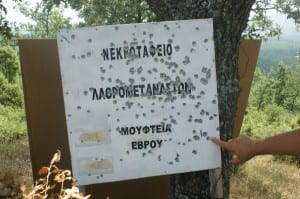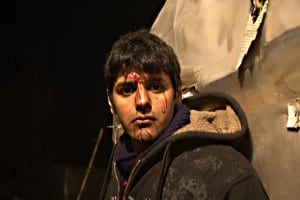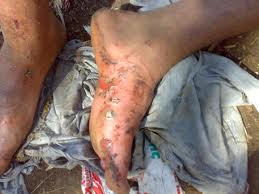HOMO SACER
PART THREE: The Camp As Biopolitical Paradigm of the Modern
Chapter 1: The Politicization of Life
Keywords: biopolitics, camp, totalitarian state, subjectivication (?), la volonte, parliamentary democracy, state of exception, habeas corpus, feudal relations, citoyen, polar character of democracy, mass democracy
1.1
- Foucault: Biopolitics = the growing illusion of man’s natural life in the mechanisms and calculations of power.
- Man’s existence as a living being is questioned, the individual objectifies oneself, is constituted as subject while simultaneously being tied to an external control power.
- There is a link between life conditions of the camp and the totalitarian rule: not just an ambition towards global rule but an attempt at complete domination.
- The labs in this experiment towards complete domination are the concentration camps, based on the notion that total dominion over human nature can only be achieved under hellish circumstances…
- The intimate merge of modern politics with bare life results in the loss of any intelligibility that may characterize the juridico-political basis of classical politics.
1.2
- The contiguity between mass democracy and totalitarian states was not something sudden but rather a hidden and continuous process in the life of the homo sacer.
- Every decisive political event however has been double sided: any liberty or right won by individuals through their conflict with central power served at the same time as a stepping stone towards an increasing inscription of the individuals’ lives in the state order. New bases where created to support the very sovereign power they seeked to be free from…
- Biological life and its needs become a political defensive fact and thus twentieth century parliamentary democracies turned into totalitarian states and today’s totalitarian states where switched back to parliamentary democracies with relative ease.
- In both cases biopolitics was involved in the sense that the decisions made where based on the question of which of the two states would best benefit the care, control and use of bare life.
- The camp appears here as the purest biopolitical space all the while remaining a hidden paradigm of the political space of modernity.
1.3
- The habeas corpus is a formula used to assure the physical presence of a person before a court of law and has at its center neither the subject of feudal relations, nor the citoyen but rather purely the corpus.
- The Magna Carta stated that “No free man may be arrested, imprisoned, disposed of his goods, or placed outside the law or molested in any way; we will not place our hands on him nor have others place their hands on him, except after a legal judgment by his peers according to the law of the realm.”
- However all that was considered the new subject of politics was the corpus, the body, upon which democracy was based.
- Once again the homo sacer and the concept of bare life come into focus. Modern democracy does not obliterate sacred life but it does disseminate it into every individual body, making it the point of interest in political conflict.
- Corpus becomes a two faced being: both the bearer of subjection to sovereign power and that of individual liberties. The new sovereign subject is now constituted through the repetition of the sovereign exception and the isolation of the bare body in himself.
- Man is not only a natural body but also a body of the city and it is precisely the body’s ability to be killed that founds both the natural equality of men and the necessity of the “Commonwealth”.
Chapter 2: Biopolitics and the Rights of Man
Keywords: imperialism, refugee, home/citoyen, nation-state, sovereign subject, citizen/citizenship, civil rights, active/passive rights, nativity, nationality, extermination, denationalize, humanitarian, social mission, solidarity, sacred life, biopolitical manifesto of modernity, sadomasochism.
2.1
- The fate of the rights of man and that of the nation-state seem to be linked.
This paradox finds its place in the face of the refugee based on the supposition that conception of human rights should be based on the assumed existence of a human being that having lost everything has only the quality of still being human.
- In the nation-state the rights of man lack every protection and reality at the moment in which they can no longer take the form of rights belonging to citizens of a state.
- In the “declaration des droits de l’homme e du citoyen” (declaration of the rights of man and citizen) it is not clear whether the two concepts (homme and citoyen) are separate or if the second already includes the first.
- Examining the text of the 1789 Declaration: The pure fact of birth appears to be the source of human rights. Nevertheless, the biopolitics of modernity seem to take away that right and bury it in the figure of the citizen, in whom rights are preserved and thus sovereignty is attributed to the nation.
- Declaration of rights is seen therefore as the place of passage from divinely authorized royal sovereignty to national sovereignty.
- The principle of nativity and the principle of sovereignty are united in the form of the sovereign subject… However there is an obvious fiction to all this: birth becomes nation and rights are attributed to man so long as he is a citizen and not because he is a human.
- Consequently human rights are now separated in two categories: the natural and civil rights for whose preservation society is formed and are called passive rights and the political rights by which society is formed and are called active rights. All people in a country must enjoy the passive rights but as it turns out not all enjoy the active rights…
- In biopolitics the threshold of what belongs to which category and what position man holds amongst all this is constantly shifting and in need of adjustment.
- Refugees are such a pain to the order of the modern nation-state because they break the continuity between man and citizen, nativity and nationality and in this bring a crisis to sovereignty.
- The refugee, should be the ultimate man of rights considering that all he has left is bare life… The fact that their life has wound up being “sacred life” that is life that can be killed but not sacrificed has put them in the position of being objects of aid and protection.
Chapter 3: Life That Does Not Deserve to Live
Emilie Autumn – The Art Of Suicide
http://www.youtube.com/watch?v=Nt1oCIojvWk
Keywords: suicide, euthanasia, sovereign over self
There is a great debate going on concerning the right to take life from one deemed “unfit” to live it…. The individual’s right to suicide seems self-explanatory if we consider sovereignty over self and agree that each person has the right to end his or her life when they see fit. However the debate remains on whether or not should be extended to the lives of others in the form of euthanasia when a person is either suffering physically or mentally, terminally ill or considered (by whom??? Who can take it on them to make such a decision???) to lead a life without value. In Nazi times elimination of the unwanted, those considered not pure enough to belong to the Arian race, was camouflaged into euthanasia… So all I can say is that the debate remains a loooong and very unclear one but at the same time the sovereign decision on bare life is not a simple political thing but resides on a more ambiguous terrain involving a multitude of sovereigns over different areas…
Correlations….
Syria’s child refugees: ‘You feel that they have lost their hearts’
http://www.youtube.com/watch?v=WARQID-U-Jg
Refugee Art
http://www.youtube.com/watch?v=yfw0ewfPQHc
Art, ingenuity + refugees: Syed Safdar Ahmed at TEDxParramatta
http://www.youtube.com/watch?v=M7Wi8vqhze0
16×9 : Taking Mercy: Euthanasia debate
http://www.youtube.com/watch?v=NxYmgrnGx_M
I am not sure how all this can apply to my work… I am opposed to any form of violence and I consiser deception to be one of those forms… The only thing that does not bother me as much is self inflicted violence provided the individual is mentaly stable and knows what they are doing… I believe in ones sovereignty over the self… I believe in the right to suicide thought it pains me because I have had it happen close to home… I do not know about euthanasia…. When another is involved there are no guarantees that one assisting will not be scarred for life…
And still I do not know…. Refugies I have met, I have had tea and talked with them in their “hidding place”. I have had a daily window washing ritual with two or three of them only to have them lost a while later when the Greek police decided to drag them off to modern day concentration camps… I even tried to warn them once when I heard ahead of time but I was too late… My family is family of immigrants… I do not understand the fear, the violance, the exclusion. But when those migrating are met with all that I do understand why their survival instict would kick in and make them fight back. And then others feel more threatened and the vicious cycle continues… There is a lot I do not understand, but I guess the mere fact that I am engaged in my everyday life, that all these issues are nagging me in the back of my head, DOES in fact influence my work… SO perhaps the thing I should do differently is acknowledge it, take it a concious step further, do the thing I have been afraid to do: include the real life every day HOMO SACER in my art…
Goodnight cruel world…



